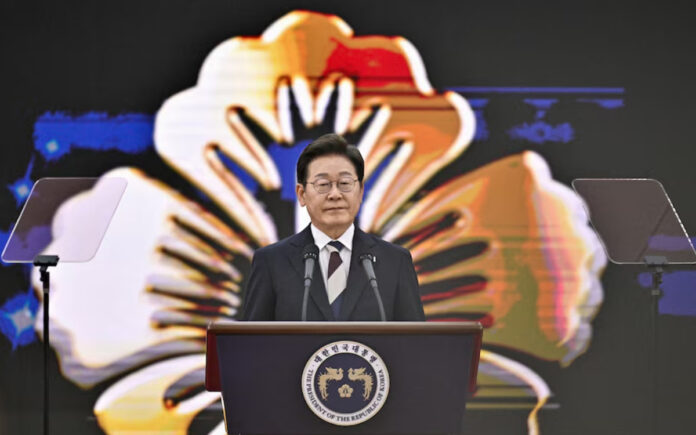Seoul: South Korea’s newly elected liberal President Lee Jae-myung has pledged to steer the nation out of what he described as the “near destruction” caused by a failed attempt at martial law and to rejuvenate the country’s faltering economy amid rising global protectionism.
Lee’s decisive victory in Tuesday’s snap election signals a dramatic shift in Asia’s fourth-largest economy. The election was triggered by the downfall of conservative President Yoon Suk Yeol, who was ousted just three years into office following public outrage over his short-lived martial law decree.
Taking the oath of office at the National Assembly—a symbolic location where six months earlier he had famously scaled a perimeter wall to cast a vote amid a security blockade—Lee laid out an ambitious agenda aimed at political healing, economic revival, and diplomatic recalibration.
“A Lee Jae-myung government will be a pragmatic pro-market government,” he declared, promising deregulation to foster innovation and pledging renewed dialogue with North Korea while strengthening ties with the United States.
“It is better to win without fighting than to win in a fight, and peace with no need to fight is the best security,” Lee added, emphasizing diplomacy over confrontation in managing tensions with Pyongyang.
Official results from the National Election Commission confirmed Lee’s win, with 49.42% of the nearly 35 million votes cast, while his conservative rival Kim Moon-soo received 41.15%. The election saw the highest voter turnout since 1997.
Immediately after being sworn in, Lee assumed full presidential powers and held his first briefing with the military’s top leadership to review national defense posture.
He has vowed to confront the country’s most pressing economic issues from day one, with a focus on alleviating cost-of-living burdens for middle- and low-income families, as well as helping struggling small businesses.
“With democracy alive, I hope the president will revive the economy, and have consideration for underprivileged citizens and small business owners,” said Seoul resident Kim Eun-kyung, 58.
In financial markets, optimism around Lee’s proposed reforms drove a rally in South Korean stocks. The benchmark KOSPI (.KS11) jumped more than 2% to a 10-month high, with financial and renewable energy stocks leading gains amid expectations of deregulation and a pivot to greener energy sources.
To address a power vacuum and prepare for swift governance, Lee nominated four-time lawmaker Kim Min-seok as his prime minister. Kim had attracted attention last year for predicting that Yoon might attempt to impose martial law—a warning that proved prescient.
Also Read | Global Conflicts Force Airlines into Risky and Costly Reroutes
Meanwhile, Lee is under immediate pressure to renegotiate contentious trade duties imposed by U.S. President Donald Trump, which have significantly impacted South Korea’s key industries, including steel and automobiles.
“President Lee will find himself with little to no time to spare before tackling the most important task of his early presidency: reaching a deal with Trump,” said the Center for Strategic and International Studies (CSIS) in Washington.
U.S. Secretary of State Marco Rubio congratulated Lee and reaffirmed the nations’ “ironclad commitment” to their alliance rooted in shared values and economic cooperation.
While the White House welcomed the free and fair nature of Lee’s election, a U.S. official reiterated Washington’s concerns over Chinese interference in democratic processes globally.
Also Read | 36 Years On: Global Voices Remember Tiananmen Square Massacre
Lee has signaled a more balanced foreign policy approach—especially toward China and North Korea—emphasizing the importance of maintaining robust trade ties with Beijing. At the same time, he has expressed reluctance to take a firm position on rising tensions in the Taiwan Strait.
Nevertheless, Lee reaffirmed that South Korea’s alliance with the United States remains the foundation of its international diplomacy and pledged to continue engagement with Japan, building on the efforts of his predecessor.



